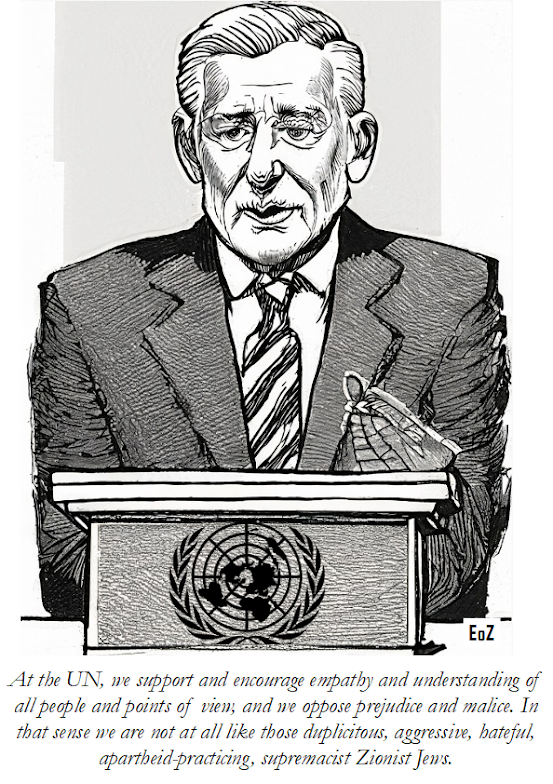An Inquisition, Not an Inquiry
The first interim report, published in May 2022, concludes that “prima facie evidence… convincingly indicates that Israel has no intention of ending the occupation.” It’s an odd assertion to make in light of historical evidence. In all three rounds of final status talks since the Oslo process began (2000-1, 2007-8, 2013-4), Israel made its willingness to withdraw from nearly all occupied territory in exchange for peace public and known, but all three rounds ended with Palestinian rejections of mediated offers for Palestinian statehood, without any real pushback from Arab public opinion or from the various international bodies aligned with the Palestinian cause.
But nowhere is rejection of Israel mentioned in either the reports, the terms of reference, or in any of the hearings. And for a commission so keen to find evidence of “systematic discrimination and repression based on national, ethnic, racial or religious identity,” they are surprisingly silent on antisemitism in the Arab World as a cause, or even an effect, of the conflict. Nothing about the pogroms of Arab masses against Jewish minorities in the first half of the twentieth century, nothing about the Arab attempt to wipe out the Jewish state in 1948 and 1967, nothing about the mass expulsions and ethnic cleansing of Jewish minorities that had lived in the Middle East for millennia in the middle of the twentieth century, and nothing about the decades of violent attacks on Jews and Jewish targets throughout the world in the name of the Palestinian “struggle.” Do any of these things have any bearing on Israel’s actions or on the reasons why Jews in the Middle East feel so strongly that they need a state? The COI won’t ask, the witnesses it calls won’t say, and its reports won’t even mention.
The second mandate isn’t actually a call to investigate the roots of the conflict and the ways to solve it. It is, rather, a denial that there ever was a conflict. Not just a denial of armed action by Arabs against Jews, but a denial of the cause they fought for.
In the intellectual ecosystem of obsessive Israel-hatred, this is why the “apartheid” charge is so crucial — and why the groundwork is already being laid for the next buzzword that will inevitably be thrown at Israel within the coming decade, “genocide.”
The shift from Arab-Israeli conflict to Israeli-Palestinian conflict was needed to deny that a tiny minority in the middle east was being attacked by the overwhelming majority, which had mostly succeeded in wiping out that minority’s presence wherever it was unable to defend itself. The shift from Israeli-Palestinian conflict to occupation was needed to deny a conflict at all and thus any kind of reckoning with the actions of both sides rather than just the one that had won most of the wars. If the problem is just the occupation, then the whole issue is just the sin of the Israelis. The shift from occupation to apartheid means that the sin cannot be expiated. It is rather, essential to the existence of Israel. An occupation can end, but if the whole concept of a Jewish state is itself evil, then pathological hatred of it can be maintained and nurtured regardless of what it does.
In this ecosystem, the pathology that animates the Arab war against Jews in the Middle East is both unspoken and implicitly adopted. Obsessive hatred of Israel, the cause for so many pointless wars, is not only given no explanatory power for the Palestinian predicament, it is actually internalized as a normative position of human rights. Israel isn’t conceived of as a state that may do bad things, but rather as an entity whose very existence is an affront to all that is good and righteous in the world.
Sometimes this becomes almost self-parodying. The COI’s report promises that a “gender analysis is being mainstreamed throughout the Commission’s work.” To this end, every few pages there will be a random reference to Israel’s supposed crimes against women.
The non sequiturs about gender are far more revealing and informative than intended. At first glance, they are disjointed, out of context, and sometimes make improbably inferences about the actual parties in the conflict (is Palestinian society really such a feminist paradise in comparison to Israeli society?). But if you are theologically committed to the idea that one people bear the sins of humanity with them, then it is not a great leap attaching whatever the social ill of the day is to that people. Next year’s report on Israeli abuses might include a few random mentions of how the occupation contributes to climate change or racist policing in the West or whatever new issue arises without materially affecting its quality.
This is not nearly as new as it seems.
US leads 27 nations in castigating an anti-Israel UN commission
The United States issued a joint statement Tuesday on behalf of 27 countries, saying they are “deeply concerned” about a United Nations commission accused of bias against Israel and populated with members with histories of antisemitism.Israeli Foreign Minister Eli Cohen issued a statement on Tuesday calling the commission’s latest report “one-sided and false.”
The U.N. Commission of Inquiry investigating the Israeli-Palestinian conflict is delivering its latest report to the U.N. Human Rights Council today in Geneva.
The Human Rights Council created the three-person commission in 2021 following an 11-day conflict (“Operation Guardian of the Walls”) between Israel and terrorist groups in Gaza. The commission was given a unique open-ended mandate: It is charged with investigating any Israeli human rights violations both inside and outside the country’s sovereign territory.
Michèle Taylor, U.S. ambassador to the U.N. in Geneva, said in the joint statement that the commission’s mandate, “with no sunset clause, end date, or clear limitations connected to the escalation in May 2021,” led to many of the council’s members expressing “fundamental concerns” when the resolution creating the commission came up for adoption.
“To be clear, no one is above scrutiny and it is this council’s responsibility to promote and protect human rights the world over. We must work to counter impunity and promote accountability on a basis of consistent and universally applied standards,” the statement reads. “We believe the nature of this COI [commission of inquiry] is further demonstration of long-standing, disproportionate attention given to Israel in the council, and must stop.”
The signatories to the joint statement include a diverse geographical group. Albania, Austria, Bulgaria, Cameroon, Canada, Croatia, Czechia, Eswatini, Fiji, Guatemala, Hungary, Israel, Italy, Kenya, Liberia, Marshall Islands, Micronesia, Nauru, North Macedonia, Palau, Papua New Guinea, Poland, Romania, Slovakia, Togo and the United Kingdom joined Washington in signing on.
That is five more countries than signed on to a previous statement critical of the commission of inquiry and its members.
Disproportionate scrutiny
“We continue to believe that this long-standing disproportionate scrutiny should end, and that the council should address all human rights concerns, regardless of country, in an even-handed manner. Regrettably, we are concerned that the Commission of Inquiry will further contribute to the polarization of a situation about which so many of us are concerned,” Tuesday’s statement concluded.
2/ “We believe the nature of this Commission of Inquiry is further demonstration of long-standing, disproportionate attention given to Israel in the Council, and must stop.
— Hillel Neuer (@HillelNeuer) June 20, 2023
The Council should address all human rights concerns, regardless of country, in an even-handed manner.…
UN Watch: 27 states call out bias of UN's Pillay Commission of Inquiry
“We believe the nature of this Commission of Inquiry is further demonstration of long-standing, disproportionate attention given to Israel in the Council, and must stop.
The Council should address all human rights concerns, regardless of country, in an even-handed manner.
Regrettably, we are concerned that the Commission of Inquiry will further contribute to the polarization of a situation about which so many of us are concerned.”
Hi @AustraliaUN_GVA, might I enquire please, is there a reason Australia did not join the statement of these 27 nations in condemning the abhorrently one-sided and discriminatory UN Commission against Israel? Australia at least issued statement last year. @dfat @AusAmbIsrael https://t.co/wspSRSfS4p
— Arsen Ostrovsky (@Ostrov_A) June 20, 2023
2/ “One of our obstacles to our work is the Media. We are particularly disturbed by the Western media in the manner in which it reports the situation on the ground. The case of Al-Aska [sic] Mosque is the most glaring where a direct military intervention to attack worshippers in…
— Hillel Neuer (@HillelNeuer) June 20, 2023
































.jpg)






















